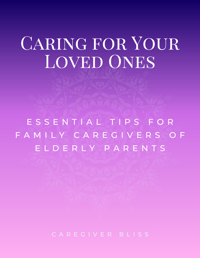20 Dementia Insights for Elderly Family Caregivers

As our parents age, it becomes crucial for us to understand and address the challenges they may face. Dementia is a condition that affects many elderly individuals, impacting memory, cognitive function, and daily life.
In this article, we'll explore 20 essential things you need to know about dementia to better support and care for your aging parents.
- Dementia Defined: Dementia is not a specific disease but a term encompassing a range of cognitive disorders. Alzheimer's disease is the most common form, accounting for 60-70% of cases.
- Symptoms Vary: Dementia symptoms include memory loss, confusion, difficulty communicating, and changes in mood. However, these can manifest differently in each individual.
- Early Diagnosis Matters: Recognizing dementia symptoms early allows for better management and planning. Consult a healthcare professional if you notice signs in your parent.
- Types of Dementia: Alzheimer's, Vascular Dementia, Lewy Body Dementia, and Frontotemporal Dementia are some common types, each with distinct characteristics.
- Risk Factors: Age, family history, genetics, and certain health conditions can increase the risk of developing dementia.
- Lifestyle Impact: Adopting a healthy lifestyle, including regular exercise and a balanced diet, can reduce the risk of dementia.
- Medication Management: Some medications may contribute to memory loss. Regularly review your parent's medications with their healthcare provider.
- Communication Strategies: Effective communication becomes crucial. Use clear and simple language, be patient, and maintain eye contact.
- Behavioral Changes: Dementia can lead to behavioral changes like aggression or withdrawal. Understanding these changes is key to providing appropriate care.
- Safety Precautions: As dementia progresses, safety becomes a concern. Take steps to create a secure environment at home.
- Legal and Financial Planning: Help your parent plan for the future by discussing legal matters, such as power of attorney and financial planning.
- Support Groups: Joining support groups can provide emotional support and helpful tips from others facing similar challenges.
- Home Modifications: Adapt the home to accommodate the changing needs of someone with dementia. Simple modifications can enhance safety.
- Memory Aids: Use memory aids like notes, calendars, and labels to assist with daily tasks.
- Maintain Routine: Establishing a daily routine helps provide structure and predictability.
- Encourage Independence: Allow your parent to do as much as they can for themselves, promoting a sense of independence.
- Patience is Key: Patience is crucial when dealing with repetitive questions or tasks. Stay calm and composed.
- Professional Caregiver Assistance: Consider hiring professional caregivers to provide additional support and respite for family members.
- Continual Learning: Stay informed about the latest advancements in dementia research and caregiving techniques.
- Emotional Well-Being: Both caregivers and individuals with dementia may experience emotional challenges. Seek counseling or support when needed.
Conclusion
Navigating the complexities of dementia when caring for aging parents requires patience, understanding, and a wealth of knowledge. By educating yourself on these 20 key aspects of dementia, you can create a more compassionate and supportive environment for your loved ones as they face this challenging journey.
We'd love to hear your thoughts and experiences! Share your insights on caring for aging parents with dementia in the comments below. Whether you have valuable tips to add, personal stories to share, or questions seeking guidance, your input can contribute to building a supportive community for those navigating the challenges of dementia care. Let's learn from each other and foster a space of understanding and encouragement.
Dementia Resource Page
Dig deeper into understanding dementia. Visit our comprehensive Dementia Resource Page for valuable insights, practical tips, and expert guidance on navigating the complexities of dementia and striving to provide the best possible quality of life for your loved one.
Free Guide:
Caring For Your Loved Ones
 Attention family caregivers! Are you struggling to provide the best care for your aging parents? Don't worry, we've got you covered.
Attention family caregivers! Are you struggling to provide the best care for your aging parents? Don't worry, we've got you covered.
Download our free guide, Caring for Your Loved Ones: 10 Essential Tips for Family Caregivers of Elderly Parents, and unlock the secrets to becoming an exceptional caregiver.
From adapting the home environment to promoting independence, this invaluable resource will transform your caregiving experience into a more rewarding journey. Don't wait—give your loved ones the care they deserve, and download your free copy today!
